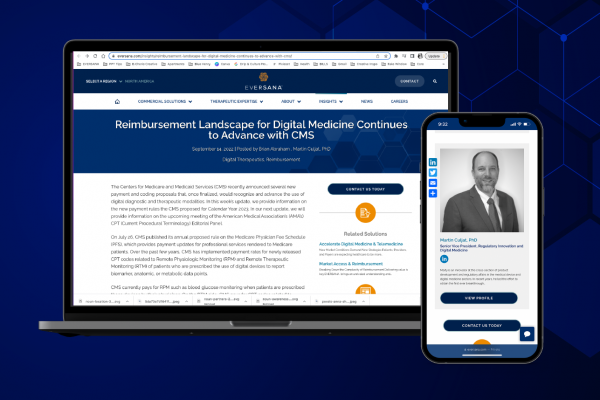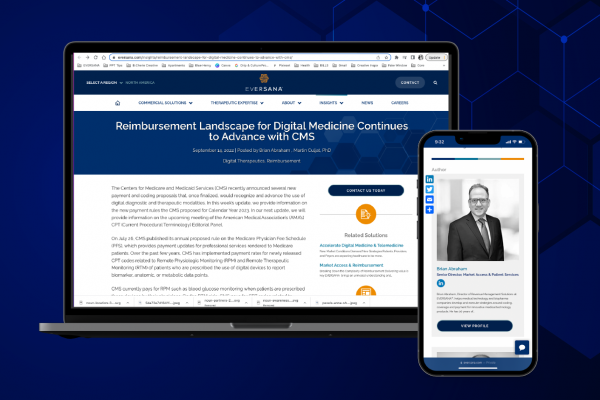
Brian Abraham, Director of Revenue Management Solutions at EVERSANA™, helps medical technology and biopharma companies develop and execute strategies around coding, coverage and payment for innovative medical technology products. He has 20 years of experience in various therapeutic areas inside companies such as MedImmune (now part of AstraZeneca), IBA Molecular, and Nuo Therapeutics, as well consulting to them. Brian has built reimbursement strategies and teams from early stage through commercialization and worked closely with the Centers for Medicare and Medicaid Services (CMS) on technical and policy issues, including during his time at the Medical Imaging Technology Alliance (MITA). Throughout his career, he has successfully built strategies and teams for market access and reimbursement. Brian earned a bachelor’s degree in Government from the College of William & Mary and a master’s degree in Public Administration from the George Washington University.
Articles by Brian Abraham

Commercializing Digital Health as Durable Medical Equipment: A Conversation with BearingOn.Health
Join EVERSANA’s Brian Abraham, Senior Director of Market Access and Patient Access, as he engages in a thought-provoking conversation with Adam Kaufman of BearingOn.Health. Together, they unravel the complexities surrounding digital health commercialization and reimbursement models, shedding light on the regulatory, pricing, and market access implications. In this exclusive discussion, Brian Abraham and Adam Kaufman explore five distinct models that are shaping the landscape of digital health commercialization: Commercializing Digital Health as Durable Medical Equipment Commercializing Digital Health as Physician Administrated Services Commercializing Digital Health as Pharmaceutical, PBM Commercializing Digital Health as Programmatic Spend Commercializing Digital Health as Direct to Consumer As the conversation unfolds, Brian Abraham shares invaluable insights […]

Understanding the Inflation Reduction Act: Drug Price Negotiation
In this second of a series, we explore the details known so far about Medicare drug price negotiation resulting from the implementation of the Inflation Reduction Act. The Centers for Medicare and Medicaid Services (CMS) has gradually been releasing guidance for manufacturers on the negotiation process. As this information has been released, Merck and the U.S. Chamber of Commerce have sued CMS to stop the process, saying CMS has overstepped its authority, even though the IRA is now statute. These suits could delay the implementation of the negotiation program beyond the dates we list here. Two major points to keep in mind are that the first round of negotiated rates […]

Breaking Down Q1 2023 Digital Health Policy Updates
Insights and Implications on AI/ML Software, Companion Apps for Pharma, Digital Diagnostics, VR Software, Breakthrough Devices, and More There was a barrage of activity by FDA in Digital Health at the end of 2022, including the wind-down of the Digital Health Pre-Certification program, final guidance on Clinical Decision Support Software, Mobile Medical Applications, Medical Device Data Systems, and Computer-Assisted Detection (CAD) Software, draft guidance on Cybersecurity, resource pages on Augmented Reality/Virtual Reality and Artificial Intelligence/Machine Learning (AI/ML). There were also several notable reimbursement decisions and legislative activities at the end of 2022 and into 2023, including new CPT codes and payer decisions on remote monitoring. There has been another barrage […]

Understanding the Inflation Reduction Act: Inflation Rebates
Prescription drug manufacturers routinely implement price increases for a variety of reasons that support their business. With the passage of the Inflation Reduction Act late in 2022, Congress added a twist to these price increases. One provision of the Act, also known as the IRA, implements rebates from pharmaceutical companies to Medicare for price increases that outpace inflation. The Centers for Medicare and Medicaid Services (CMS), the federal agency that oversees Medicare, recently issued guidance for manufacturers to operationalize the statute. Common Elements The IRA mandates that pharmaceutical manufacturers that sell their products prescribed to Medicare Part B and Part D beneficiaries will be subject to these inflation rebates. For […]

Bringing a CPT Code to Life to Help in the Fight Against Cancer
An interview with Navid Alipour, CEO of CureMatch, and Brian Abraham, Sr. Director, Market Access & Patient Services with EVERSANA On January 1, CureMatch, a leader in precision medicine that has developed a unique analytical platform to solve the therapeutic complexity and match the best therapy options to the unique molecular makeup of a patient’s cancer, announced that the American Medical Association (AMA) issued a new Current Procedural Terminology (CPT®) Category III code, which will be available for oncologists as of July 1, 2023, to submit reimbursement claims to insurers for using the platform in the fight against cancer. This revolutionary platform is helping to further pave wider adoption for […]

AMA Scheduled to Deliberate Potential Approval of Additional Digital Medicine CPT Codes
As part of its upcoming meeting in mid-September, members of the American Medical Association’s (AMA) CPT Editorial Panel will consider several new Current Procedural Terminology (CPT) codes that identify digital diagnostic and therapeutic procedures. Between this CPT Editorial Panel meeting and the proposed rule from the Centers for Medicare and Medicaid Services (CMS) previously discussed, it is apparent that payers are continuing to recognize the need to evaluate, cover, and reimburse for these innovations. Panelists primarily discuss two major types of codes during this meeting: permanent and temporary codes. Permanent codes, known as Category I codes, receive an indexed value, known as Relative Value Units (RVUs) and can then be […]

Reimbursement Landscape for Digital Medicine Continues to Advance with CMS
The Centers for Medicare and Medicaid Services (CMS) recently announced several new payment and coding proposals that, once finalized, would recognize and advance the use of digital diagnostic and therapeutic modalities. In this week’s update, we provide information on the new payment rules the CMS proposed for Calendar Year 2023. In our next update, we will provide information on the upcoming meeting of the American Medical Association’s (AMA’s) CPT (Current Procedural Terminology) Editorial Panel. On July 26, CMS published its annual proposed rule on the Medicare Physician Fee Schedule (PFS), which provides payment updates for professional services rendered to Medicare patients. Over the past few years, CMS has implemented payment […]

New Legislation Supports Payment for Digital Therapeutics
Earlier this month, the Access to Digital Prescription Therapeutics Act of 2022 was introduced by Rep. Mike Thompson (D-CA) to the U.S. House of Representatives as H.R. 7051 and by Sen. Shelley Moore Capito (R-WV) to the U.S. Senate as S. 3791. This precedent-setting legislation demonstrates the bicameral, bipartisan commitment to promoting the use of digital prescription therapeutics and having public insurers cover their use. The identical bills mandate coverage of prescription digital therapeutics (PDTs) by Medicare and Medicaid and set forth the general process for how the Centers for Medicare and Medicaid Services (CMS) will administer the coverage. The legislation defines PDTs as products that are approved or cleared […]

Prescription Digital Therapeutics Coding: A Good First Step by CMS
The Centers for Medicare and Medicaid Services (CMS) recently issued a new code under the Healthcare Common Procedural Coding System (HCPCS) regarding prescription digital therapeutics (PDTs). These types of therapies are generally app- or device-based and can be used in any therapeutic category. This is certainly an exciting development for the PDT sector, as many companies in the space have been targeting claims-based reimbursement for their products, and scalable reimbursement has not yet been widely achieved. During the July 2021 coding application cycle, one developer of cognitive behavioral therapies (CBTs) applied for three different HCPCS codes to identify the use of their apps in CBT to treat substance abuse as […]

Breaking News: Updates on Digital Medicine Coding and Payment
Over the past several months, we have been following the activities of the American Medical Association (AMA) and the Centers for Medicare and Medicaid Services (CMS) regarding coding and payment, respectively, for digital medicine products. Both organizations made significant steps forward in the past few weeks to include some of these innovative products in the medical reimbursement stream. Here is the latest news and our analysis. Cognitive Behavioral Therapy (CBT) Applications Many digital therapeutics are designed to deliver a digitized form of condition-specific cognitive behavioral therapy (CBT) for adjunctive treatment of a variety of conditions. The Digital Therapeutics Alliance (DTA), AdvaMed, and others have made considerable efforts to create payment […]

TOP NEWS: CMS Proposes Repeal on Medicare Coverage of Innovative Technologies Initiative
In a reversal of its upcoming policy to cover breakthrough designated medical devices, the Centers for Medicare and Medicaid Services (CMS) on Monday issued a proposed rule that would completely repeal the Medicare Coverage of Innovative Technologies (MCIT) initiative, and it would not go into effect in December of this year. Their reasoning is as follows: Even though the affected products receive FDA clearance and breakthrough designation, there is no requirement, as there is with other Medicare coverage mechanisms, to show effectiveness in a Medicare population; so the product(s) may end up being detrimental to Medicare beneficiaries without a level of evidence showing effectiveness and no harm to this population. […]

American Medical Association Discusses New CPT Codes to Identify Digital Health Services
In our last update, we discussed the proposed rule that the Centers for Medicare and Medicaid Services (CMS) issued regarding the addition of certain Current Procedural Terminology (CPT®) codes to identify remote therapeutic monitoring (RTM) in parallel to the existing remote physiological monitoring (RPM) codes and their expected payment rates. Now we’re looking at what could happen over the next year or two as the American Medical Association (AMA) releases new codes that identify additional digital health services. Several new codes will be up for discussion during the September 2021 CPT Editorial Panel meeting, in which the panel members deliberate over proposed new and revised codes that healthcare providers will […]

CMS Releases Remote Therapeutic Monitoring Codes for 2022
The Centers for Medicare and Medicaid Services (CMS) released the proposed Medicare physician fee schedule regulation for 2022, which includes an analysis and payment calculations for the new Remote Therapeutic Monitoring (RTM) CPT codes issued by the American Medical Association (AMA) late last year. As announced in earlier this year, these codes may enable indirect reimbursement for digital therapeutics and similar devices by identifying the physician’s (or other qualified professional) services that will be associated with utilizing the device. This may allow digital therapeutic manufacturers to offer their products to healthcare providers as a service and for the provider to get reimbursed for setup, use and management of the product. […]

News Alert: MCIT Program Delayed Until December
The Centers for Medicare and Medicaid Services (CMS) again delayed implementation of the Medicare Coverage of Innovative Technology (MCIT) program, now until December 15, 2021. The program, as described in the current and preceding rules, will provide automatic Medicare coverage for four years to medical devices designated as breakthrough and authorized for marketing by the U.S. Food and Drug Administration (FDA). In the Final Rule to be published this week in the Federal Register, CMS states there are several reasons for this additional delay. The delay does not come as a surprise as there were many unanswered operational and policy questions from the January 2021 Final Rule (86 Fed Reg […]

News Alert: MCIT Implementation Delayed
On Friday, March 12, the Centers for Medicare and Medicaid Services (CMS) issued an Interim Final Rule with Comment (IFC) delaying the effective date of the Medicare Coverage of Innovative Technologies (MCIT) initiative from March 15 to May 15, 2021. In postponing the implementation date, CMS cited the President’s Executive Order of January 20, 2021, that allows for the delay of pending regulations so the new administration can review their impact. The order also allows for the reopening of comments on pending regulations to determine if there are concerns regarding operational, governmental or citizen impact. In the IFC, CMS stated directly that because coding and payment systems would not be […]

Webinar: Drug Pricing and Reporting Regulatory Updates Part 1
Pharmaceutical companies in the U.S. are navigating President Biden’s new administration and legislative changes that are affecting pricing and regulatory actions. One of these changes includes the regulatory freeze ordered for actions made in the final two months of the Trump administration, which has paused Medicare Part B and Medicare Part D legislation as well. In part one of our drug pricing and reporting regulatory updates webinar, EVERSANA’s Michael Kurland and Brian Abraham discuss what pharma companies need to know about the regulatory freeze and what legislative lag means for pricing and regulation. Specifically, Part 1 looks at the following: Updates on Actions by the Biden Administration Medicare Part B: Most Favored Nation Medicare Part D: Rebate Safe […]

Reimbursement May Be on the Way for Remote Therapeutic Monitoring
The American Medical Association (AMA) manages the procedure code set that physicians and other healthcare professionals use to identify the services for which they bill. These codes are commonly known as the CPT® code set, which stands for Current Procedural Terminology, and are the standard billing lexicon for medical services. Currently, four CPT codes identify remote monitoring of physiologic data such as weight, blood pressure, pulse oximetry, etc. A few cardiac monitoring codes also include remote collection and/or monitoring of these data. Until now, the CPT code set has not contained any codes to identify remote monitoring of therapeutic interventions, such as those provided by a handheld or digital therapeutic […]

Drug Pricing And Drug Price Reporting Regulatory Update
As the new president and Congress begin their terms, EVERSANA would like to provide an update on recent legislative and regulatory actions that affect drug pricing and price reporting. The Centers for Medicare and Medicaid Services (CMS) issued this interim final rule on November 20, 2020 (85 Fed Reg 76180-76259), requiring a revised calculation of payments for the top 50 drugs by historic spending under Medicare Part B. The new payment level, to be phased in over four years, is based on the lowest price paid by a member country of the Organization of Economic Cooperation and Development (OECD) with at least 60% of the per-capita gross domestic product (GDP) of […]

CMS Adopts Automatic Medicare Coverage of Breakthrough Devices
The Centers for Medicare and Medicaid Services (CMS) on January 12 finalized its proposal of Medicare Coverage of Innovative Technology (MCIT), an additional pathway of coverage for breakthrough-designated medical devices, providing timelines and clarifying definitions of eligible items. CMS initially proposed this rule on August 31, 2020, and EVERSANA’s initial analysis is provided here. The rule will go into effect March 15, 2021, at which time Medicare will cover and reimburse medical devices that are designated as breakthrough by the U.S. Food and Drug Administration (FDA). These devices also must be authorized for marketing to receive Medicare coverage for four years. Clarification of Eligible Medical Devices While the proposed and […]

